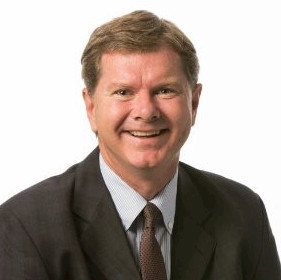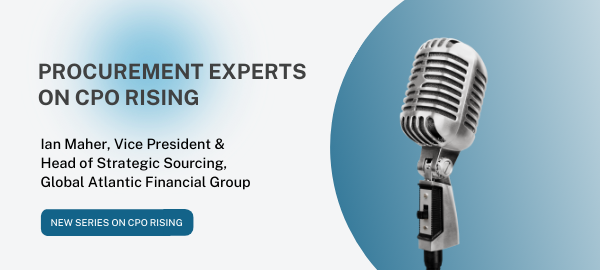Our “Procurement Experts on CPO Rising” series continues today an excerpt from my 2021 episode of the Procurement Rising Podcast – Ian Maher, Global Atlantic Financial Group (click to listen to the full interview). Note that this excerpt has been edited for readability.
Starting a New CPO Role with Ian Maher

Andrew Bartolini: So, Ardent Partners, we’ve done research over the past couple of years, and we’ve noticed a trend that the average job tenure for a new CPO is now less than four years. I think that that’s in the larger context of the changing relationship between employers and their employees. I think that this means that transitioning into a new CPO role is a valuable skill set and since you’ve done it recently, I want you to walk our listeners through the on-boarding process. What are some of the things that new CPOs can do to prepare for their new role before they join so that they can hit the ground running?
Ian Maher: Oh, boy, that’s such a good question. Because I do spend a lot of time looking back at the transition and the on-boarding process for myself and for others that are in a similar position. I know I’m probably quite self-critical, I thought I may have known most of the things that go into the CPO role, both managing the political side of things, understanding the business, looking at the organizational construct from within the procurement function. I thought that I got a really good understanding of global antics. The truth is, I probably didn’t, and I wish I had gone a little bit deeper in my diligence, and really probed in some of the areas in that sort of 60-day period before joining. I probably would have valued going in a bit deeper and understanding the “why?” behind some of the questions. Because I’m now starting to understand, okay, the company had a particular mindset about investing in procurement. It was driven by a certain business driver, and I might not have made that natural connection. It’s probably cost me a longer length of time to really get my hands around, and ultimately to address those things that I should have uncovered prior to joining the company. That’s taken effort, it’s taken investment, and it’s probably elongated the length of time until I felt we could get ourselves to a basic position. So, I think looking back I wish I had really delved into the people that I met, prior to joining with some deeper follow up calls, and really pushed on the “why?” question, more than the “how?” question. I think I would have been in a better place if I’d done that.
AB: When you could have asked those questions, do think you should of asked during the interview process or post offer, or when?
IM: I think it’s actually both. I wish before I’d accepted the offer that I had really delved into getting the lay of the land on some of the fundamentals of the procurement organization. So, the state of the contract repository, the relationship with legal, an understanding of what the investment plan looked like for the next two to five years, the drivers that had really created the role in the first place. So, like many places, organizations will take some type of outside counsel, they will come and look at an organization and they’ll deliver you the book to say yes, the savings, opportunities, of course they do. But what they don’t tell you is the how, and not many cases, these firms don’t really understand the differences between a service in the financial services company, and those on the manufacturing side. So, I wished I’d really probed beyond the first interview, perhaps more one-on-one with the individuals that I met that I felt I had a good rapport with, that I could have gone back and said, hey, what’s really driving this and who is driving it? Is it the CFO? Is it the risk side of the house? Is it Legal? What are the real sort of issues that we’ve got that will make me understand, okay, job one within the first 100 days needs to be XYZ. I think that would have put me in a better position. I had to negotiate the offer, because it’s not so much just about the compensation and the package. It’s about what the organization is willing to commit to, for you to move into and dedicate the next move in your career towards. So, I think in short, it would have been deeper conversations, one-on-one with the people I interviewed prior to the offer. Then once that offer is accepted and signed on the dotted line, then I think it is just a refinement about priorities and hierarchy of what’s most important to moment line management, and understanding sort of the organizational dynamics to make sure I don’t get blindsided by something that comes along to say, oh, well, you really need to be doing this, and my mindset was actually to do a different sort of foundational improvement.
To hear the full conversation, click here – Procurement Rising Podcast – Ian Maher, Global Atlantic Financial Group.
MORE CPO TOPICS
Procurement Experts on CPO Rising (Mergers, Acquisitions AND CPOs)
Procurement Experts on CPO Rising (Deploying Technology During a Pandemic)
Procurement Experts on CPO Rising – The Procurement Diagnostic
Procurement Experts on CPO Rising (A Modern Approach to Source-to-Pay)

